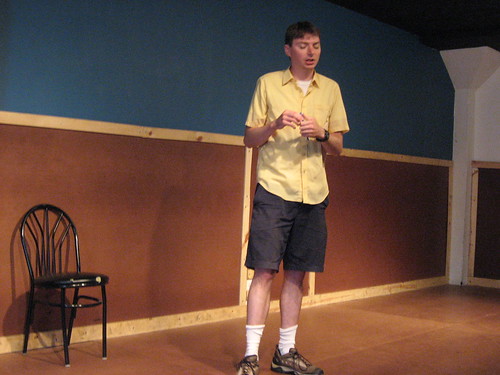Because it saw a group of black people.
Incidentally, this is also the answer to the questions
- Why did the chicken clutch its purse?
- Why did the chicken send its kids to private school?
- and...
- Why did the chicken move to the suburbs?
This is where Baratunde blogs about things. He also blogs over on his company blog, Cultivated Wit, so check there too. Ooh, you can also get these bloggings via email.
Viewing entries in
Comedy
Because it saw a group of black people.
Incidentally, this is also the answer to the questions
 New week. New level. New teacher. Introducing Pat O'Brien, a director at Second City and a member of the young "team to watch" at iO, The Reckoning.
First, I gotta say, it's been great to have teachers that actually do improv, regularly, and well. The Reckoning is that cool young team that everyone's talking about. They do two shows a week. One is a straight Harold format. The other is them experimenting with all kinds of form. I saw one show, referred to as a Bat, where they did the whole show in the dark. No physical movement was involved, just speaking and some sound effects from random crap they brought onstage. It reminded me of old radio shows my mom loved.
The purpose of week 4 is to really learn The Harold, that infamous, all-encompasing, truth-seeking, and very challenging structure pioneered by Del Close himself.
Harold Diagnostic
Pat began class by splitting us into two groups of seven and eight, respectively. Each group did a full Harold based on what we'd learned already, and he offered a boatload of feedback, criticisms and ideas. As it would become clearer over the course of the week, one of Pat's strengths is in showing us the possibilities for any given show or scene. He helped us think about the connections we didn't pick up on that could make a show much better. Given the amount of information one must keep track of in a Harold, he also shared a simple but infinitely valuable tip:
Keep it fun, and focus on one aspect of the Harold at a time.
For example, in one show you might decide that you're gonna focus on editing. In another, you focus on playing emotionally. Etc. etc.
His advice after watching our first two Harolds included:
New week. New level. New teacher. Introducing Pat O'Brien, a director at Second City and a member of the young "team to watch" at iO, The Reckoning.
First, I gotta say, it's been great to have teachers that actually do improv, regularly, and well. The Reckoning is that cool young team that everyone's talking about. They do two shows a week. One is a straight Harold format. The other is them experimenting with all kinds of form. I saw one show, referred to as a Bat, where they did the whole show in the dark. No physical movement was involved, just speaking and some sound effects from random crap they brought onstage. It reminded me of old radio shows my mom loved.
The purpose of week 4 is to really learn The Harold, that infamous, all-encompasing, truth-seeking, and very challenging structure pioneered by Del Close himself.
Harold Diagnostic
Pat began class by splitting us into two groups of seven and eight, respectively. Each group did a full Harold based on what we'd learned already, and he offered a boatload of feedback, criticisms and ideas. As it would become clearer over the course of the week, one of Pat's strengths is in showing us the possibilities for any given show or scene. He helped us think about the connections we didn't pick up on that could make a show much better. Given the amount of information one must keep track of in a Harold, he also shared a simple but infinitely valuable tip:
Keep it fun, and focus on one aspect of the Harold at a time.
For example, in one show you might decide that you're gonna focus on editing. In another, you focus on playing emotionally. Etc. etc.
His advice after watching our first two Harolds included:
 photo by me via Flickr
This post is a bit out of order, but I feel compelled to post it now. On the same day of Susan Messing's Insane Story Theatre Workshop, I went to a session run by Seth Thomas, an actor and hip hop artist based in Chicago. His hour was a presentation of an approach he developed to help you create believable characters. It's called The 70, and it's hot.
Here's Seth's pitch or theory
photo by me via Flickr
This post is a bit out of order, but I feel compelled to post it now. On the same day of Susan Messing's Insane Story Theatre Workshop, I went to a session run by Seth Thomas, an actor and hip hop artist based in Chicago. His hour was a presentation of an approach he developed to help you create believable characters. It's called The 70, and it's hot.
Here's Seth's pitch or theory
"In a world of vampire Nazis, lesbian vampire Nazis are just lesbians."We began this day focusing on opposite emotions. "You can 'yes' too much," Bill taught us. We should "allow the insane to shine." The lesbian vampire Nazi point is pretty self-explanatory if you think about it. If you make everything weird, then nothing is weird and you have no contrast, no surprises and no heightening within a scene or piece. Don't Talk about X We did this exercise where there was a huge elephant in the room we couldn't mention by name, but our characters had to behave with the knowledge of the thing unmentionable. I was wrong in my post about Level 3, Day 2. It was day THREE where I did that abortion scene with Leanne (BTW, Bill has a nickname for abortions: "abobo"). We had to play the scene without mentioning the actual abortion, and not saying it directly really heightened the emotion. Our class also did scenes involving two brothers who hadn't seen each other for 20 years but were reunited at a will reading for one of their dead parents, plus a scene in which someone had a terminal illness. Intensity, Integrity, Intelligence When playing, especially with emotions, be sure to base it on these three things. More wisdom from Bill:
"The best part about heavy metal music is that it doesn't remind you of being dumped... because it's about dragons."I don't even remember what that was referring too, but it seemed worth writing down. Build a World, then Destroy It Ok, now this was hella fun. Bill had us create a reality (including the emotion of the scene) and then absolutely tear it down with some incongruous statement. I came out as a happy clown. "Hello little girl" etc. etc. It was a birthday party. The kid was happy. I made balloons. Then I said: "No go get me some pussy! That's right, bring your mama's fine ass over here and tell her to bend over!" The little girl cried. For those new to my blog, let me explain that it wasn't a real little girl, but an ACTOR in my IMPROV class. The point was to destroy this reality of a happy clown and happy little girl on her birthday. The thing that popped into my head was what I said, and it was absolutely wrong and damn hilarious!!! Wow, I'm laughing just remembering that joint. Multi-person scenes Oops that was the next day, to be posted soon!